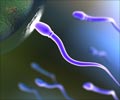Pregnant women with cancer, who use etoposide, may give birth to female babies who are likely to undergo an early menopause.

- A woman’s reproductive lifespan is determined before birth while ovaries are developing in the womb
- The germ cells form structures called follicles during the 2nd & 3rd trimester, which determine how many eggs a woman will release in the future
- In mouse ovary tissue grown in lab, chemotherapy drug called etoposide, which is considered safer during later stages of pregnancy, was found to damage the development of germ cells
- Doctors should carefully weigh treatment options before applying it to prevent long-term side-effects
A study has revealed that the future fertility of unborn baby girls’ can be affected by chemotherapy treatment during pregnancy. In experiments conducted on mouse ovary tissue grown in the lab, researchers at the University of Edinburgh studied the effects of a drug called etoposide. The drug has been found to affect specialized cells called germ cells, that give rise to eggs. Further research is paramount to assess the similar effects of the drug on human tissue. These findings call for intimation of a future possibility of early menopause in the affected baby girls.
A woman's reproductive lifespan is determined before birth, while the ovaries are developing in the womb. The female germ cells develop into structures called follicles during the second and third trimesters. This determines how many eggs a woman will be able to release in her lifetime. Follicles begin to develop at 17 weeks into baby’s development and continue until later stages of pregnancy. So this period is crucial in considering treatment options. However the longer term effects of the drugs on unborn baby still remains unclear.
The study published in the journal BMC Cancer stated that, if the drug when used on mouse ovary tissue grown in lab before the development of follicles, destroyed 90% of the germ cells even at lower doses. On the other hand after the development of follicles, no significant adverse effects were noted.
Lead researcher Professor Norah Spears, of the University's Centre for Integrative Physiology stated "If the results we have seen in these mouse studies are replicated in human tissue, it could mean that girls born to mums who are taking etoposide during pregnancy have a reduced fertility window."
The study was funded by the Medical Research Council and the Biotechnology and Biological Sciences Research Council.
- Cancer drug for mums-to-be may curb baby girls' future fertility - (http://www.eurekalert.org/pub_releases/2016-08/uoe-cdf080916.php)















